HOW TO CULTIVATE A GROWTH MINDSET FOR PEAK PERFORMANCE

Introduction:
In the picturesque town of Ooty, nestled in the scenic Nilgiri Hills of Tamil Nadu, India, two twins were born on a stormy night. They were separated soon after birth and given up for adoption to two different families. Little did anyone know that the beliefs and mindset instilled in them during their formative years would shape their destinies in dramatically different ways.
The first twin, Arjun, grew up with adoptive parents who believed in the power of hard work, dedication, and the idea that abilities and intelligence can be developed through perseverance and learning. They encouraged him to embrace challenges, see them as opportunities for growth, and persist in the face of obstacles. Arjun imbibed these values from a young age and grew up with a growth mindset.
The second twin, Rohit, was adopted by a family that believed abilities and intelligence are predetermined and cannot be changed. They discouraged him from taking risks or embracing challenges, and he grew up with a fixed mindset. Rohit often gave up easily when faced with obstacles and felt threatened by the success of others, leading to jealousy and a lack of motivation. He languished, doing odd jobs and living in abject poverty.
As the years passed, Arjun and Rohit took divergent paths in life, shaped by their respective mindsets. Arjun pursued higher education, excelled in academics and sports, and eventually became a successful entrepreneur and athlete. He embraced challenges, saw failure as an opportunity for growth, and persevered despite setbacks. On the other hand, Rohit struggled to find his footing in life, plagued by self-doubt and a fixed mindset that limited his potential.
Arjun’s success story became a beacon of inspiration for many, and people marveled at his ability to overcome challenges and achieve peak performance. But what set him apart? How did he develop a growth mindset that propelled him to success? Let’s explore the concepts in depth.
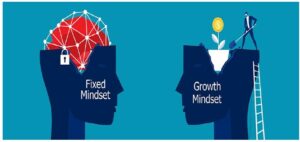
Embracing Challenges:
Arjun learned early in life that challenges are not obstacles to be feared, but opportunities for growth and learning. He understood that facing challenges head-on can lead to personal and professional development. Instead of shying away from challenges, he embraced them with enthusiasm and a positive attitude.
Arjun’s adoptive parents encouraged him to try new things, take calculated risks, and step out of his comfort zone. They taught him that challenges are not roadblocks, but stepping stones towards success. Arjun took up various challenges in academics, sports, and personal life, and approached them with a mindset that viewed challenges as opportunities to learn, grow, and expand his horizons.
For example, in school, Arjun struggled with math, but instead of giving up, he sought help, practiced diligently, and eventually mastered the subject. He participated in sports competitions, knowing that he might not always win, but he saw every competition as a chance to improve his skills and learn from his mistakes. This mindset of embracing challenges and seeing them as opportunities for growth became deeply ingrained in Arjun’s personality and propelled him to achieve peak performance.
Seeing Failure as an Opportunity for Growth:
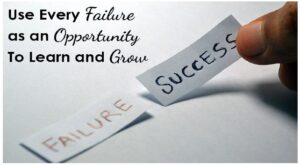
Arjun also learned that failure is not something to be feared or avoided, but a valuable learning experience. He understood that failure does not define one’s abilities or intelligence, but it provides an opportunity to reflect, learn, and make adjustments for future success.
When Arjun faced failures or setbacks, he did not dwell on them or succumb to self-doubt. Instead, he embraced a “fail forward” mentality, where he saw failure as a stepping stone towards success. He analyzed his mistakes, learned from them and made necessary improvements. He did not let failure deter him from pursuing his goals but rather used it as a catalyst for growth and improvement.
For example, in his entrepreneurial journey, Arjun faced multiple failures and setbacks. Some of his business ventures failed, and he made mistakes along the way. However, he did not view these failures as the end of the road, but as valuable lessons that helped him refine his approach, learn from his mistakes, and come back stronger.
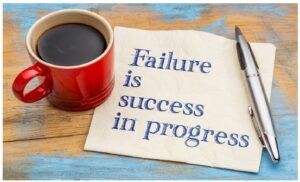
Arjun’s adoptive parents also played a crucial role in shaping his mindset towards failure. They taught him that failure is a natural part of the learning process and should not be feared or avoided. They emphasized that mistakes and failures are opportunities to learn and grow, and encouraged him to persevere in the face of setbacks.
Resilience and Perseverance:
Another important aspect of cultivating a growth mindset is developing resilience and perseverance. Arjun learned that success does not come easy, and setbacks are inevitable on the path to peak performance. However, what sets apart those who achieve peak performance is their ability to bounce back from failures and persevere despite challenges.
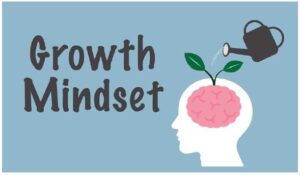
Arjun developed resilience through consistent practice and effort. He learned to view setbacks as temporary hurdles that can be overcome with determination and perseverance. He did not give up easily, but instead, he persisted in the face of challenges, and kept pushing forward towards his goals. He understood that success is a journey, not a destination, and it requires resilience and perseverance to overcome obstacles along the way.
Arjun’s adoptive parents also instilled in him a positive attitude towards challenges and failures. They taught him to see setbacks as opportunities to learn and grow, and to never give up on his dreams. They encouraged him to stay resilient, persevere in the face of challenges, and keep striving for excellence.
Positive Attitude:
A positive attitude is another essential element in cultivating a growth mindset for peak performance. Arjun learned that having a positive attitude towards challenges, failures, and setbacks can greatly impact his ability to achieve success. He understood that a positive attitude enables him to approach challenges with optimism, learn from failures without getting discouraged, and maintain a mindset of continuous improvement.

Arjun developed a positive attitude through self-awareness and self-reflection. He learned to manage his thoughts and emotions, and to cultivate a positive outlook towards life. He practiced gratitude, focused on his strengths, and reframed challenges as opportunities for growth. He surrounded himself with positive influences and learned from successful individuals who had a growth mindset.
Arjun’s positive attitude also extended to how he viewed others’ success. He did not feel threatened by the success of others, but instead, he celebrated their achievements and saw them as inspiration for his own growth. He understood that everyone has their unique strengths and talents, and their success does not diminish his own potential.
Arjun’s story exemplifies how cultivating a growth mindset can lead to peak performance. By embracing challenges, seeing failure as an opportunity for growth, developing resilience and perseverance, and maintaining a positive attitude, Arjun was able to overcome obstacles and achieve success in his entrepreneurial and athletic endeavors.
The journey towards peak performance requires a mindset that embraces challenges, sees failures as opportunities for growth, and maintains a positive attitude towards oneself and others. It requires self-awareness, self-reflection, and consistent effort to develop a growth mindset that propels one towards excellence.
As you embark on your own journey towards peak performance, remember Arjun’s story and the power of a growth mindset. Embrace challenges, learn from failures, develop resilience and perseverance, and cultivate a positive attitude. With a growth mindset, you can unlock your true potential and achieve peak performance in any area of your life.
PRACTICAL STRATEGIES TO CULTIVATE A GROWTH MINDSET FOR PEAK PERFORMANCE
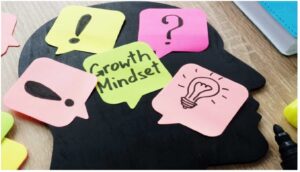
Embrace Challenges: Challenge yourself to step out of your comfort zone and take on new tasks or projects that push your boundaries. Embrace challenges as opportunities for growth and learning, rather than as threats or obstacles. Approach challenges with a positive attitude, and see them as a chance to develop new skills, gain experience, and expand your capabilities.
For example, if you are working on a project at work that seems daunting, instead of feeling overwhelmed, view it as a chance to learn and improve your skills. Break the project down into smaller, manageable tasks, and tackle them one by one. Celebrate your progress and the skills you acquire along the way, rather than focusing on the difficulties.
Embrace Failure as a Learning Opportunity: Shift your mindset towards failure from being a negative outcome to being a valuable learning opportunity. Understand that failure is a natural part of the learning process and does not define your worth or potential. When you encounter failure, reflect on what went wrong, what you can learn from it, and how you can improve in the future.
For instance, if you fail to achieve a goal or make a mistake, instead of dwelling on the failure or feeling discouraged, take it as a chance to learn and grow. Ask yourself what you could have done differently, what you learned from the experience, and how you can apply those lessons to future situations.
Develop Resilience and Perseverance: Cultivate resilience and perseverance in the face of challenges and setbacks. Recognize that success does not come overnight and that setbacks are inevitable on the path to peak performance. When faced with obstacles or failures, do not give up easily, but rather, persist with determination and a positive attitude.
For example, if you encounter a setback, such as not getting a promotion or facing rejection in a job application, do not let it discourage you. Instead, use it as a motivation to improve your skills, seek feedback, and keep working towards your goal. Cultivate a mindset of resilience that views setbacks as temporary hurdles that can be overcome with perseverance and effort.
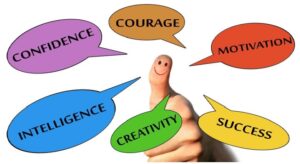
Maintain a Positive Attitude: Cultivate a positive attitude towards yourself, others, and life in general. Practice gratitude, focus on your strengths, and reframe challenges as opportunities for growth. Surround yourself with positive influences, such as mentors or supportive peers, who can encourage and inspire you to maintain a positive mindset.
For instance, when facing challenges or setbacks, avoid negative self-talk or self-blame. Instead, practice self-compassion and kindness towards yourself. Celebrate your achievements and progress, no matter how small, and focus on your strengths and capabilities. Maintain a positive outlook towards life, and see the potential for growth and improvement in every situation.
Embrace a Love for Learning: Cultivate a curiosity and eagerness to learn throughout your life. Embrace a love for learning and see it as a lifelong journey, rather than a destination. Seek out new knowledge, skills, and experiences that can help you grow and improve.
For example, make it a habit to read books, articles, or research papers related to your field of expertise or areas of interest. Take courses, attend workshops or seminars, and engage in continuous learning opportunities. Stay open to new ideas, perspectives, and feedback, and be willing to adapt and update your knowledge and skills as needed.
Practice Self-Reflection and Self-Awareness: Develop self-reflection and self-awareness as essential tools for personal and professional growth. Regularly reflect on your thoughts, emotions, and behaviors, and how they impact your mindset and performance. Be honest with yourself and identify any limiting beliefs or negative thought patterns that may be hindering your growth mindset.
For instance, if you notice that you tend to doubt your abilities or have a fear of failure, take a moment to reflect on the underlying beliefs or emotions that may be driving those thoughts. Challenge and reframe them to align with a growth mindset. Practice self-awareness to recognize when you may be falling into a fixed mindset and consciously shift towards a growth mindset.
Cultivate a Supportive Environment: Surround yourself with a supportive environment that fosters a growth mindset. Surround yourself with people who believe in your potential, encourage your growth, and provide constructive feedback. Avoid negative influences or toxic environments that may hinder your progress or reinforce a fixed mindset.
For example, seek out mentors or coaches who can provide guidance and support in your personal and professional development. Collaborate with colleagues or peers who are also committed to growth and learning. Create a positive and inclusive work culture that promotes continuous improvement, innovation, and collaboration.
Set Meaningful Goals: Set meaningful goals that align with your values, strengths, and aspirations. Goals can provide direction, motivation, and a sense of purpose, which are essential for cultivating a growth mindset. Set realistic and achievable goals that challenge you to stretch beyond your comfort zone, but are also within your capabilities.
For instance, set short-term and long-term goals that are specific, measurable, attainable, relevant, and time-bound (SMART). Break down larger goals into smaller, manageable steps, and track your progress along the way. Celebrate your achievements and learn from any setbacks or obstacles that you may encounter.
Practice Mindfulness: Cultivate mindfulness as a practice to develop a growth mindset. Mindfulness involves paying attention to the present moment with non-judgmental awareness. It can help you become more aware of your thoughts, emotions, and behaviors, and enable you to respond to challenges or setbacks with clarity and intention.
For example, practice mindfulness techniques such as deep breathing, meditation, or body scan exercises to cultivate a present moment awareness. When faced with challenges or setbacks, pause, and observe your thoughts and emotions without judgment. This can help you respond to the situation with a growth mindset, rather than reacting impulsively or emotionally.
Practice Positive Affirmations: Practice positive affirmations to reinforce a growth mindset. Use positive and empowering language to affirm your abilities, potential, and worth. Repeat affirmations that align with a growth mindset regularly to rewire your subconscious mind and reinforce positive beliefs about yourself and your abilities.
For example, use affirmations such as “I am capable of overcoming challenges and growing stronger,” “I embrace failure as a learning opportunity,” “I am resilient and persevere in the face of obstacles,” or “I am constantly learning and improving.” Say these affirmations to reinforce a growth mindset.
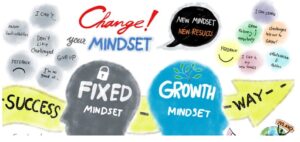
I personally believe that developing a growth mindset is one of the most essential steps to achieving success and living a fulfilling life. I’ve personally experienced the power of a growth mindset in my own life. When I first started writing, I struggled with self-doubt and fear of failure. However, I made a conscious effort to shift my perspective and view mistakes as opportunities for growth. I began seeking out feedback and critiques, rather than avoiding them, and worked to continuously improve my craft. As a result, I’ve been able to publish multiple books and build a successful writing career.
Famous individuals like Michael Jordan, Oprah Winfrey, and J.K. Rowling are great examples of individuals who have embraced a growth mindset. Michael Jordan, widely considered one of the greatest basketball players of all time, was initially cut from his high school basketball team. Rather than viewing this as a failure, he used it as motivation to work harder and eventually became a star player. Oprah Winfrey, a media mogul and philanthropist, grew up in poverty and faced numerous challenges throughout her life. However, she used these obstacles as opportunities for personal growth and worked tirelessly to build her career. J.K. Rowling, author of the Harry Potter series, faced rejection from multiple publishers before finally finding success. Rather than giving up, she persisted and continued to improve her writing skills, eventually becoming one of the most successful authors in history.
Carol S. Dweck’s book, “Mindset: The New Psychology of Success,” is a groundbreaking work that explores the impact of mindset on success. The book is based on years of research and provides insights into how our mindset can either help or hinder our ability to achieve our goals.
Dweck identifies two types of mindsets – fixed mindset and growth mindset. Dweck’s book goes on to explore how mindset impacts different areas of our lives, including relationships, parenting, business, and education. She provides real-world examples and practical advice on how to cultivate a growth mindset and overcome the limitations of a fixed mindset.

Other good books on mindset include “Grit: The Power of Passion and Perseverance” by Angela Duckworth, “The Mindset Makeover: Tame Your Fears, Change Your Self-Sabotaging Thoughts, and Learn from Your Mistakes” by Anne Marie McQuaid, and “Peak: Secrets from the New Science of Expertise” by Anders Ericsson and Robert Pool.
Conclusion:
Cultivating a growth mindset is a lifelong journey that requires awareness, effort, and practice. Embrace challenges, failures, and setbacks as opportunities for growth and learning. Develop resilience, perseverance, and a positive attitude towards yourself and others. Practice self-reflection, self- awareness, and mindfulness to become aware of your thoughts, emotions, and behaviors, and consciously align them with a growth mindset. Surround yourself with a supportive environment that fosters growth and learning, and set meaningful goals that challenge you to stretch beyond your comfort zone. With a growth mindset, you can unlock your full potential, achieve peak performance, and thrive in all areas of your life.

Remember the story of the twins from Ooty. While one twin with a growth mindset embraced challenges, persisted in the face of obstacles, and achieved great success, the other twin with a fixed mindset gave up easily, felt threatened by the success of others, and struggled with poverty and odd jobs. The power of a growth mindset cannot be overstated, and by cultivating it, you can unlock your own potential and achieve peak performance in whatever you set your mind to.
So, go ahead and embrace a growth mindset, and let it be the driving force behind your pursuit of excellence and success. Believe in your abilities, embrace challenges as opportunities for growth, and keep learning, growing, and improving. With a growth mindset, you can achieve peak performance and fulfill your highest potential.
 Dr K. Jayanth Murali is a retired IPS officer and a Life Coach. He is the author of four books, including the best-selling 42 Mondays. He is passionate about painting, farming, and long-distance running. He has run several marathons and has two entries in the Asian book of Records in full and half marathon categories. He lives with his family in Chennai, India. When he is not running, he is either writing or chilling with a book.
Dr K. Jayanth Murali is a retired IPS officer and a Life Coach. He is the author of four books, including the best-selling 42 Mondays. He is passionate about painting, farming, and long-distance running. He has run several marathons and has two entries in the Asian book of Records in full and half marathon categories. He lives with his family in Chennai, India. When he is not running, he is either writing or chilling with a book.

May 29, 2023 at 9:04 AM /
Its a wonderful article sir.